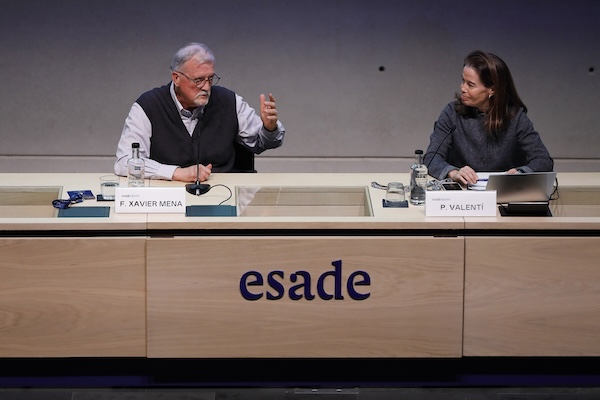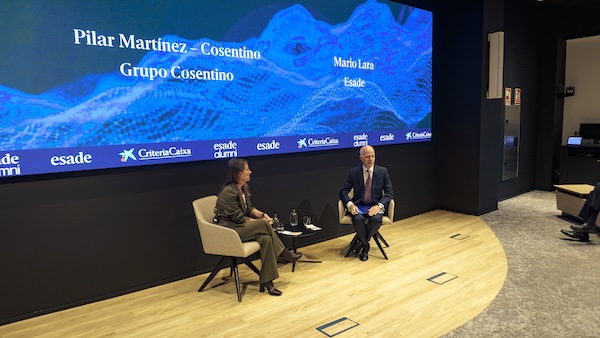Raül Giménez (AGT '00), the CEO of Adecco LATAM, was featured in a new session of the Global Leader Talks entitled “Job trends in LATAM: Uncertainties, risks and opportunities.”

Global Leader Talks are sessions on good practices in the business world with global professionals and international leaders in specific sectors who give us the knowledge and inspiration to be better professionals in terms of management and social responsibility. This time, Raül Giménez talked with Javier S. Casademunt (AMP '13), director of Esade for Brazil and academic collaborator of the Strategy and General Management Department at Esade, about the latest job trends from the globalization of LATAM and the opportunities and challenges that organizations are facing in their bid to retain and attract top talent.
Raül Giménez has more than 20 years of business leadership experience in multinational settings. He has lived in Spain, Switzerland, Mexico and Chile and currently resides in Atlanta (Georgia, USA). He began his career in strategic consulting and was appointed CEO of Adecco LATAM in 2019, where he oversees the different operations in Mexico, Colombia, Argentina, Peru, Chile, Brazil, Ecuador and Uruguay. During his mandate, the business saw two-digit growth four years in a row despite experiencing difficult situations; it reached a turnover of 1B euros and has more than 3,000 employees in the region.
Major opportunities

To Giménez, the first thing to bear in mind is that we are talking about LATAM monolithically, and even though there are certainly ties that bind, each country has a very different context. “Even though we are witnessing stagnation on a macro level, we are still convinced of the region’s value, which is very positive in Brazil and Mexico, positive in Colombia and Peru and somewhat stalled in Chile and Argentina, which are definitely in a difficult situation.”
Regarding working conditions, he said that “corporations are here not to judge political decisions but to deal with them, but we are witnessing growth in progressive-leaning governments, which has led to measures like increases in the minimum wage, limitations on workdays, the regulation of vacations… But they are putting limitations on job flexibility, and we don’t think this is the right way for the region to grow, since it needs job flexibility to rise to the challenges looming on the horizon.”
Challenges facing the region
Giménez explained that some LATAM markets are less mature, but the individual growth possibilities are vast. “For example, consumption in a market with 200 billion inhabitants in young societies is enormous,” he noted.
Regarding nearshoring, the tendency to outsource services to foreign but relatively nearby companies, he said: “It is a really intriguing phenomenon that has opened up a business line with a great deal of growth in the past three years. Before COVID, outsourcing went to Asia, but since the pandemic we’re seeing how the United States wants to move these services to countries that are closer, especially Mexico, Brazil and Colombia.” He added that according to a study at Stanford University, 10% to 20% of the business support positions based in the United States are expected to be offshored or nearshored within the next decade. “We’re talking about an incredible volume of business for the LATAM workforce. I think it’s going to be a pivotal point in the region. Plus, the service quality is good compared to other countries, and this surprises US customers.”

Javier S. Casademunt also asked Raül Giménez about the most sought-after job profiles in LATAM, and he said that digital platforms, anything related to technology and engineering, are the most in demand and that these candidates are in a powerful position. “The health sector is still really strong, and we think that this is structural, while automotive is on the upswing again and consumer goods is also strong. Remote shared services are also in demand,” he responded.
However, reskilling is one of the challenges facing the region, and while there is talent capable of competing globally, Giménez highlighted several shortcomings in this sphere, along with informality in hiring, which has risen in all countries: “I’m surprised that this problem is not being dealt with because failing to protect workers with formal contracts is a threat.”
Javier S. Casademunt concluded the session by highlighting the importance of lifelong learning as a way to handle all the opportunities that are arising in the region. “We’ve talked about important issues like the economic asymmetries that large organizations are taking advantage of, the markets with the biggest growth, important strategies for the upcoming years and the need for training in the new skills that the market is demanding: critical thinking to question things, and creative thinking to use the new technologies.”
Visit our Content Hub to watch a video of the session




































